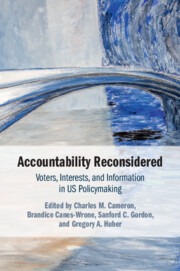Book contents
- Frontmatter
- Dedication
- Contents
- Figures
- Tables
- Contributors
- Acknowledgments
- 1 Introduction
- Part I Candidate Evaluation and Selection
- 2 The Importance of Issue Representation in a Polarized Congress
- 3 Can Citizens Assess Policies Based on Programs’ Costs and Benefits? The Role of Yardsticks and Contextual Information in Democratic Accountability
- 4 Logic with Polarized Parties, Changing Media, and Motivated Reasoners
- 5 Groups, Parties, and Policy Demands in House Nominations
- Part II The Media and The Informational Environment
- Part III Policymaking, Information Provision, and Accountability
- Part IV Outside The Public Eye? Private Interests and Policymaking
- Bibliography
- Author Index
- Subject Index
5 - Groups, Parties, and Policy Demands in House Nominations
from Part I - Candidate Evaluation and Selection
Published online by Cambridge University Press: 09 February 2023
- Frontmatter
- Dedication
- Contents
- Figures
- Tables
- Contributors
- Acknowledgments
- 1 Introduction
- Part I Candidate Evaluation and Selection
- 2 The Importance of Issue Representation in a Polarized Congress
- 3 Can Citizens Assess Policies Based on Programs’ Costs and Benefits? The Role of Yardsticks and Contextual Information in Democratic Accountability
- 4 Logic with Polarized Parties, Changing Media, and Motivated Reasoners
- 5 Groups, Parties, and Policy Demands in House Nominations
- Part II The Media and The Informational Environment
- Part III Policymaking, Information Provision, and Accountability
- Part IV Outside The Public Eye? Private Interests and Policymaking
- Bibliography
- Author Index
- Subject Index
Summary
Rounding out Part 1, Kathleen Bawn, Knox Brown, Angela X. Ocampo, Shawn Patterson, Jr., John L. Ray, and John Zaller report results from one of the largest “on the ground” studies of candidate selection ever undertaken. Focusing on fifty-three potentially winnable open seat House races in the 2013–14 election cycle, the authors interviewed local participants and observers to probe the processes behind candidate selection in primary elections. The extensive fieldwork reveals that groups, which may include local party organizations, are the central political actors in the selection process. Voters rely on signals from the groups, whose primary objective is to minimize uncertainty about a candidate’s commitment to particular policy goals. Because this objective may lead groups to promote nominees who are not closest to the primary electorates’ ideological preferences, the candidates who win may be more ideologically extreme than even the primary electorates are. The chapter therefore highlights how analyses that focus on the general election, such as Chapters 2 and 6, are dependent on the candidates that emerge from the primary selection process.
- Type
- Chapter
- Information
- Accountability ReconsideredVoters, Interests, and Information in US Policymaking, pp. 89 - 126Publisher: Cambridge University PressPrint publication year: 2023



